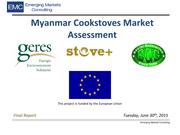Assessing the Cookstove Market in Myanmar
Overview
Results of the Myanmar Cookstove Market Assessment led by Emerging Market Consulting (EMC) and complimentary gender assessment carried out by ENERGIA International Network on Gender and Sustainable Energy (ENERGIA) have been released in September 2015.
“This Market Assessment study, supervised by GERES, is an important component of the development of sustainable biomass use in Myanmar. Our country lacks detailed and reliable research and such studies are of great value for researchers and practitioners alike.” Commented Professor Aung Kyin.
The study is the first and necessary step for the implementation of SCALE, a EU-funded project managed by GERES in partnership with EGG. With a target of 300,000 households to switch to Improved Cookstoves (ICS) and the involvement of at least 30 producers, the SCALE project aims at producing 10,000 improved cookstoves per month but also initiate a national cookstove alliance to provide a framework for market and policy dialogue.
The Main Results
Both studies gather a large amount of input on several closely related topics: cooking stoves, fuels, consumer segmentation, fuels, health, etc.
EMC conducted their research according to the international methodologies, courtesy of the Global Alliance for Clean Cookstoves. They provide a wide overview of the energy sector in 7 regions and highlighted the two areas in Myanmar where stoves are traditionally produced and where we’ll find better skilled producers: Magway and Pathein.
Nevertheless, the sector lacks technology, skills and improved stove designs. Also, marketing and management support is required to improve the supply chain.
There is a huge potential to improve the value chain of the production, and the team identified quick learners and high quality producers.
On the customer side, households with low to medium/high income, which represents 3,261,651 households, seem likely to switch to clay based ICS.
They end their report stating that“Improved Cookstove programs have high potential for long term revenues from emissions reductions.”
The Gender Perspective from ENERGIA
ENERGIA is an international network on gender and sustainable energy, and is assisting in mainstreaming gender in the SCALE programme. ENERGIA, taking a gender oriented approach, analyzes the roles of men and women especially in the household and in cookstove production centers. They combined these results with global facts about gender differences in the whole country and highlighted some inequalities that the project could contribute to reduce:
For example, in Myanmar, women have a higher literacy rate but are“paid 500 – 1000 MMK less than men as a daily wage”.
As of today, 5 women producers have been identified to be part of the programme to improve and scale-up their production. From their experience, ENERGIA expects to convince other women producers to get involved and enhance their production.
What About the End-users?
Once more, we’ll talk about women. They are the ones who mostly cook, decide which cookstove will match their needs the best, collect fuel, help with farming work or other income-generating activities.
Many women state that they are often exhausted and do not have enough time to take rest. Collecting fuel for example is very time consuming:
“They [Myanmar people] spend more than 217 hours a year on this activity [collecting fuel]” (Mercy Corps-Myanmar, 2012).
Beyond these gender issues, ENERGIA shared the results of the Global Burden of Disease assessment. Household Air Pollution (HAP) is the third risk factor of the most important causes of the disease burden in Myanmar and women from 15 to 49 years old are the most affected. This issue could be tackled while spreading cleaner and more efficient cookstoves and teaching good practices such as cooking in well-ventilated room.
Myanmar’s Environment
Finally, the studies remind the reader that the environment, in particular forests, are also impacted by fuel collection and burning biomass with inefficient stoves. Professor Aung Kyin stressed the deforestation issue by testifying:
“Myanmar's forests are in great danger of unrestrained commercial and household logging and we need to reduce the pressure on this critical natural treasure of our country.” [1]
The Way Forward
Thanks to all these results, GERES will help the Ministry of Environmental Conservation and Forestry of Myanmar tackle these issues, by designing a cleaner and more efficient stove, improving and strengthening the supply chain and raising awareness so the end-users understand the risks of cooking with traditional methods, such as the three stone fire.
The next step is related to Stove Testing and Research & Development.
For more information: www.stoveplus.org
Download the Publications
The studies:
- The complimentary gender assessment by ENERGIA International Network on Gender and Sustainable Energy (ENERGIA):http://stoveplus.org/uploads/reportPdfs/MGBR_SCALE
Further Information




















